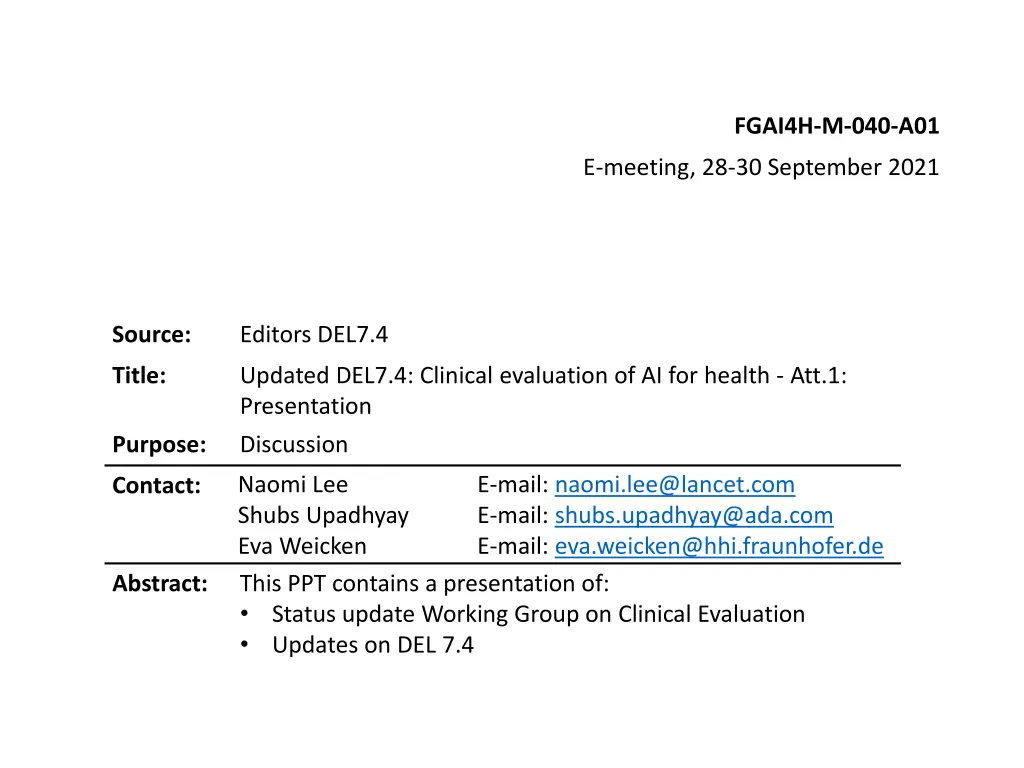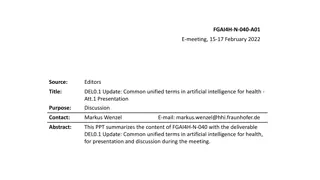
Clinical Evaluation of AI for Health Updates
Explore the latest updates on Clinical Evaluation Deliverable 7.4 in the AI for health domain. Engage in discussions and collaborations with a diverse group of global experts. Stay informed on key developments and best practices in clinical evaluation for AI in healthcare.
Download Presentation

Please find below an Image/Link to download the presentation.
The content on the website is provided AS IS for your information and personal use only. It may not be sold, licensed, or shared on other websites without obtaining consent from the author. If you encounter any issues during the download, it is possible that the publisher has removed the file from their server.
You are allowed to download the files provided on this website for personal or commercial use, subject to the condition that they are used lawfully. All files are the property of their respective owners.
The content on the website is provided AS IS for your information and personal use only. It may not be sold, licensed, or shared on other websites without obtaining consent from the author.
E N D
Presentation Transcript
FGAI4H-M-040-A01 E-meeting, 28-30 September 2021 Source: Editors DEL7.4 Title: Updated DEL7.4: Clinical evaluation of AI for health - Att.1: Presentation Purpose: Discussion Naomi Lee Shubs Upadhyay Eva Weicken This PPT contains a presentation of: Status update Working Group on Clinical Evaluation Updates on DEL 7.4 E-mail: naomi.lee@lancet.com E-mail: shubs.upadhyay@ada.com E-mail: eva.weicken@hhi.fraunhofer.de Contact: Abstract:
Working Group on Clinical Evaluation Deliverable 7.4 FG-AI4H meeting M , 28 30 September 2021
Introduction Working Group Clinical Evaluation Deliverable 7.4 = Output document of WG-CE Part of No. 7 deliverables AI4H evaluation considerations
Introduction Working Group Clinical Evaluation build a community of collaboration around clinical evaluation of AI4H guidance for current best practice evaluation, principles of evaluation (relevant across all countries) Used by: researchers, clinicians, patients, developers, civil- society, policy-makers special consideration of clinical evaluation in LMIC settings applicable for FG-AI4H
Who is WG clinical evaluation? 65+ members from all around the globe & stemming from various fields Co-chairs: Naomi Lee, Shubs Upadhyay, Eva Weicken Writing group: Kassandra Karpathakis, Alastair Denniston, Xiao Liu, Jane Carolan, Tommy Wilkinson
Where are we to date? We are in the process of creating the outline We want to give a transparent update and overview We appreciate it very much if you read the doc. and provide feedback Posted on the collaboration site: DEL 7.4
Revisions on the outline between meeting L & M We redrafted the first section, now titled model design and suitability We added ethics piece relevant to this work, by Rohit Malpani (WG-Ethics) We added a figure and table We improved consistency of message & language, reduced duplication
Work in progress Review round 2 in progress Particular discussions within the group on: security of AI technologies terminology o algorithmic validation to refer to evaluation of the AI model in silico o clinical validation to refer to evaluation of AI technology in context through clinical or interventional studies Plus: this is part of contribution for common unified terms doc
Outline Table of contents Introduction and Background Model design & suitability Algorithmic validation Clinical validation Deployment and ongoing monitoring Economic evaluation Recommendations
Introduction & Background Framework for AI models in health
Model design and suitability Understanding the problem and intended use Defining intended benefits Describing risks Interoperability and security User testing and stakeholder engagement
Algorithmic validation Algorithmic validation : to refer to evaluation of the AI model in silico Requires: understanding of the AI model through development & an assessment of the suitability of the data Assessment of performance against one or more unseen external datasets & against the current standard of care, and potentially against other new AI technologies Benchmarking of performance Building high-quality datasets
Clinical validation Clinical validation : to refer to the evaluation of AI technology in context through clinical or interventional studies Clinical studies seek to provide necessary evidence if AI is effective and safe to be deployed in clinical pathway Evaluate the impact on the whole pathway, specific guidance on AI evaluation by Equator Network List of specific elements for clinical studies
Deployment and ongoing evaluation Deployment: ensure that evaluation is continued into the deployment phase & as long as the product continues to be used (generalisability) Challenge: determine the level of additional evaluation required to appropriately assure version updates & continuously learning or adaptive algorithms Ongoing evaluation: Monitoring of ongoing performance (safety & effectiveness) Regulatory requirements Users and developers of AI systems will be the two most active stakeholders engaging in post deployment monitoring Algorithmic audits
Economic evaluation Measurement of the expected costs relative to its expected impacts when implemented into a particular context Types of economic evaluation for AI-enabled digital interventions Reimbursement
Recommendations I 1. Ensuring that AI health technologies are effective, safe, ethical, inclusive and fair. Clinical evaluation & transparent communication regarding the use of AI systems, , their underpinning data, their performance and their safety systems is critical to deliver this 2. All stakeholders must be encouraged to carry out effective clinical evaluation & make the results open & accessible, made publicly available. Availability of the clinical evaluation plan is key to building trust and should be made publicly available. 3. Algorithmic validation, including benchmarking of AI models either by locally, nationally or more widely is important to ensure local performance is acceptable, and to compare performance of tools on particular datasets. The OCI is part of the FG-AI4H that is actively developing software that can be used by stakeholders to do this on their own datasets.
Recommendations II 4. Clinical studies, especially those with long term evaluation of AI tools is required- despite the expanding number of tools, there is a paucity of long term studies with clinical endpoints and rigorous safety analyses and this is holding back the potential of these tools. There is a lack of evidence on how transferable tools are that are developed in one setting and then used in another. Collaborative studies would accelerate progress and should be considered a priority. 5. Needs based development of AI models requires a dedicated effort to collect data in populations that are currently underrepresented and for clinical problems where AI may be effective, but datasets are poor. Not only does this facilitate development but also evaluation. Organisations like I-DAIR have identified this as a key task.
Recommendations III 6. Procurers of AI tools should be clear about the economic evaluation that is required for AI tools. Not only is this important to ensure comprehensive evaluation, but it also builds trust in the evaluation system. While it is possible to find examples of where digital strategies explain what kind of evaluation should be done, it is still rare to find publicly available examplesof where this has been done, and this can undermine public trust in procurement. 7. Priority setting for digital tools in all country settings requires a much more active role for health technology assessment (HTA), in addition to the role of regulators. Where fulfilled by two different agencies, close dialogue should be maintained. Where HTA agencies already exist, these need to expand the workforce skills to include evaluation of AI technologies. In countries where HTA capacity is low, this should be a key focus alongside expanding digital health tool.
Next steps Receive feedback by 12 October 2021 & revise the outline doc. Next iteration based on feedback Follow-up meeting(s) Share the draft with WHO for review
Thank Thank you & you & Join Join us us! ! Please contact: eva.weicken@hhi.fraunhofer.de




